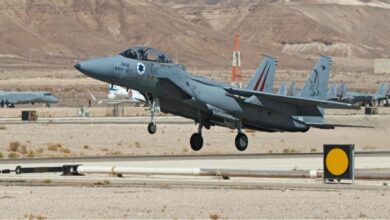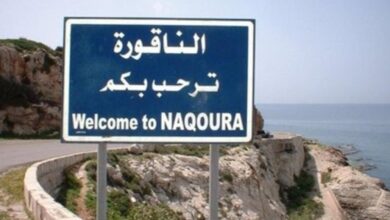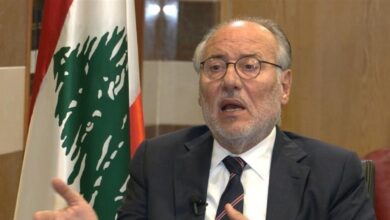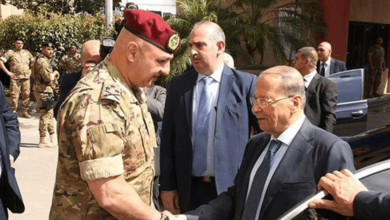Syria needs its citizens more than Lebanon needs them
Also present were the Patron of the Maronite Diocese of Zahle, Bishop Joseph Moawad, the Mufti of Zahle and the West Bekaa, Sheikh Dr. Ali Al-Ghazawi, Father Timothy Abu Rjaili, representing Bishop Antonius Al-Souri, the Director General of the Ministry of Agriculture, Engineer Louis Lahoud, the Mayor of the West Bekaa, Wissam Nasbih, the Mayor of Rashaya, Nabil Al-Masry, the President of the Union of Municipalities. Al-Beheira, Engineer Yahya Daher, President of the Union of Municipalities of Independence Castle, Issam Al-Hadi, General Coordinator of the “Future Movement” in Western Bekaa, and Rashaya Muhammad Hajar, representing the Secretary General of the Future Movement, Ahmed Al-Hariri, General Coordinator of Central Bekaa, Saeed Yassin, Judge Sheikh Ghaleb Jumaa, Judge Younis Abdel Razzaq, Member of the Supreme Sharia Council, Dr. Muhammad Al-Ajmi, Head of the Educational District in the Bekaa, Mr. Youssef Breidi, mayors and optional councils, officials of international and foreign organizations, representatives of embassies, spiritual, judicial, security and military shrines, and events.
Regarding the “Balad to Balad” association, the association’s founder, Elias Boutros Maroun, and his wife, Christine Abboud, the association’s president, Rouwaida Maroun, the activist Alaa Al-Shamali and his wife, the activist Firas Abu Hamdan and his wife, and the activist Muhammad Shafiq Hammoud, attended.
Stones
Minister Hajjar gave a speech in which he said: “For once, an association like the “Balad to Build” association is going against the grain. We will not sue it, because it is moving in the right direction, and we will try to support it and be by its side.”
Regarding the file of the displaced Syrians, Hajjar said: “We will seek to kick back the movement of the rest of the associations, not in order not to support the displaced Syrian brothers, but in order for them to support the displaced Syrians in order for them to return to their country to rebuild it. Syria needs them more than Lebanon needs them.” The other pressure that we are putting on them is, “The Lebanese need them just as the Syrian needs them, so how can the displaced Syrian be helped and I do not see the Lebanese, and therefore this means that I am subject to a path of international support in one direction, which is for them to remain in Lebanon, and so there is a loud voice.” On us and demanding of us. In humanity, we are the country in the world that deals the most with the humanitarian issue by receiving displacement and asylum, and we will continue to receive within this philosophy, but displacement and temporary asylum, because Lebanon is small and does not have food security or safety.”
Maroon
Then the head of the “Balad to Balad” association, the social activist Ruwaida Maroun, spoke and said: “My colleagues and I chose as a slogan for our association: “Life has no value unless we find something to fight for” so that we can confirm our belief in social work whose goal is the human being, whoever this human may be, and we stand by our people. In urgent daily life issues, and until we advance society to where human dignity is evident in all its dimensions.”
She added: “There are two basic reasons for establishing the association. The first stems from a family passion for public social work and love for people. The family was like this and we are following in their footsteps, as the first supporter from the family was my brother Elias, who provided the association with all kinds of information for a pioneering and uplifting moral launch. Second: The West Bekaa and Rashaya region needs all types of services, especially in light of the stifling conditions the country is experiencing. During the founding journey, our path was not only fraught with “waiting and anticipation for the release of knowledge and news, but rather we chose a path characterized by effectiveness and hard work from the first moment, out of our belief in the importance of time and the value of continuous work, so we decided to begin implementing our tasks and projects that serve our noble goals without delay”.
Maroun continued: “Today we launch the association’s work, and we have a systematic plan centered around a series of goals with which we seek capable and effective institutional work to serve the nation and the citizen, which is, in short: promoting sustainable development and implementing its 17 goals in the local community.” Strengthening primary medical health care, raising the cultural and educational level, establishing environmental, social, economic and agricultural activities, providing social and humanitarian services to marginalized and disadvantaged groups to reduce poverty, enhancing the role and empowerment of women, building active and productive youth, and networking between national, local and foreign associations.”
She concluded by thanking Minister Hajjar for his patronage, interest, and national role. She also thanked the speakers at the ceremony and the attendees for answering the invitation.
Lahoud
Then the Director General of the Ministry of Agriculture, Engineer Louis Lahoud, spoke and praised the work of the association, stressing the importance of coordination between productive sectors to improve the national economy, calling for strengthening initiatives that would jumpstart the economic wheel, alleviate people’s suffering, and open the horizons of innovation in all fields.
Al-Ghazawi
In turn, the Mufti of Gaza called on “the Arabs and the West to preserve Lebanon so that the bridge remains protected, because Lebanon needs protection and care.”
He also called for “giving social affairs the care that will alleviate the suffering of citizens,” stressing “the importance of raising the level of transparency in the work of ministries and associations, and giving precedence to the logic of institutional work,” stressing “the necessity of agreeing on the interest of Lebanon and fulfilling constitutional and national entitlements, so that the situation is regulated.” The state and its institutions.”
Mouawad
Then Bishop Moawad spoke and said: “Lebanon, in the current economic and financial circumstances, finds itself unable to develop the education sector, social security, medicine and hospitalization, create job opportunities, and raise individual income, so that living conditions would improve and migration would reduce. It is unable to achieve balanced development in the various Lebanese territories, and this weakens social justice and stability.”
Moawad appealed to the Lebanese state to “carry out the necessary economic and financial reforms as soon as possible, and eliminate corruption, so that it can thus improve the social conditions of the citizen, especially in education and hospitalization, and provide adequate income, and thus a decent living.” But the first requirement remains the political agreement, as it has become known that when the nation is politically agreed, it is economically agreed.”
He continued: “The identity of this association is a charitable civil association that we need in these difficult circumstances that we are suffering from in Lebanon. One of the main areas in which it is involved, as was reported to us, is developing society through creating job opportunities, and this is an urgent need in Lebanon as the number of unemployed people is increasing. One of its goals is to help the needy.”
Dialogue session
After a brief presentation about the association, a dialogue session was held entitled “The Reality of Challenges and Opportunities,” in which the head of the educational district in the Bekaa, Professor Youssef Breidi, spoke about the educational sector, the head of the financial and economic department at Rafic Hariri University, lecturer Dr. Muhammad Tarabeh, and the specialist in gynecological surgery and obstetrics, Dr. Lebanon Abu Madi on the health sector, founder and general director of the “Development Indicators” Association, human rights activist Fayez Okasha on the social sector.
The celebration concluded with a cocktail party in honor of the guests.
[previous_post_link]





